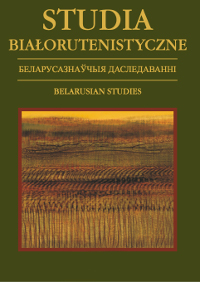Poetycki model prozy Iwana Ptasznikaua
(na przykładzie opowieści Łonwa)
Poetical Model of Ivan Ptasznikau’s Prose (on the example of the novel Łonwa)
Author(s): Beata SiwekSubject(s): Language and Literature Studies, Studies of Literature, Belarussian Literature
Published by: Wydawnictwo Naukowe Uniwersytetu Marii Curie-Sklodowskiej
Keywords: poetics; narrative strategies; sound organization; space; rhythm of prose
Summary/Abstract: This article is devoted to an issue of the poetry of Ivan Ptasznikau’s prose that is illustrated on the example of one of the most significant texts written by this Belarusian author titled Łonwa (1964). The novel is built around historical issues (events from The Second World War and its consequences) and makes a perfect example of a conscious creation of a narrative language, dialogues and characters’ monologues on a strategy basis and techniques typical of poetic texts. It is proved not only by countless metaphors and comparisons, behind which the author was hiding a painful wartime reality but also by excellent syntax organisation that brings out new semantic spaces of the piece. Ivan Ptasznikau mixes various types of repetition (anaphors, epiphors and concatenations) within relatively short sections in an incredibly skillful way and uses sound values from the repetitiveness of letters and syllables (their multiplications or prolongations), thanks to which he creates a very suggestive space, saturated with colours, sounds and smells that are used not necessarily as a background for characters or events but as a means to shape senses and meanings that emerge from the plot. What is particularly interesting is the fact that he combines a narrative level with a feature level by using sound and rhetorical devices and a peculiar linguistic and stylistic over–organization. Particular words, recurring phrases and systematically recurring strategies and syntax tricks (especially those that form the so–called poetry of atmosphere) bond these two levels together, broadening the interpretation field of the whole piece.
Journal: Studia Białorutenistyczne
- Issue Year: 1/2021
- Issue No: 15
- Page Range: 187-199
- Page Count: 13
- Language: Polish

